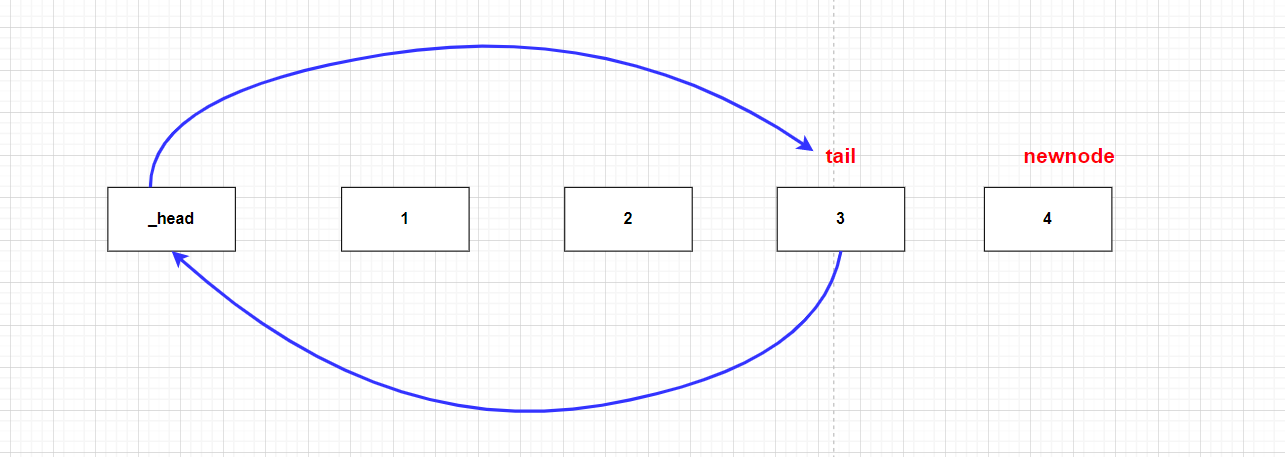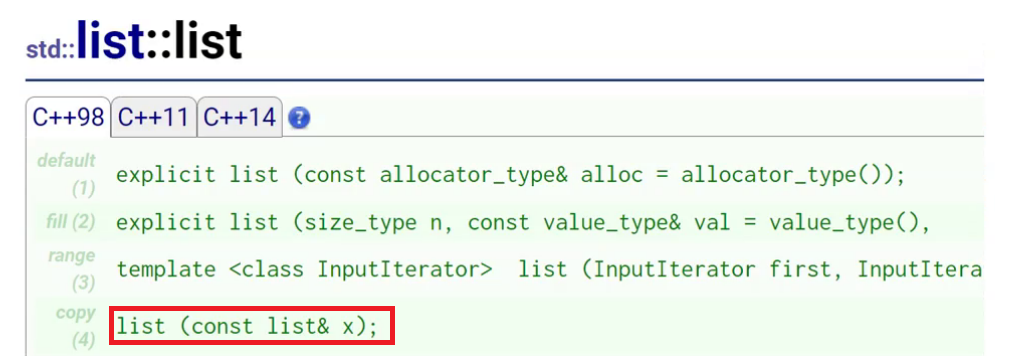文章目录

一、整体框架
list的本质就是带头双向循环链表,我们直接来看一看整体框架:
namespace hwc
{
//结点
template<class T>
struct list_node
{
list_node* _next;
list_node* _prev;
T _data;
list_node(const T& x)
:_next(nullptr)
, _prev(nullptr)
, _data(x)
{}
};
template<class T>
class list
{
typedef list_node<T> node;
public:
//迭代器
typedef __list_iterator<T> iterator;
typedef __list_const_iterator<T> const_iterator;
//构造
list()
{
_head = new node(T());
_head->_next = _head;
_head->_prev = _head;
}
private:
node* _head;
size_t _size;
};
}
第一个要实现测试的是push_back,后面可以直接复用insert():
尾插就是把新结点和原来的尾结点和头结点进行链接,这是我们很熟悉的了,直接动手实现:
void push_back(const T& x)
{
node* newnode = new node(x);
node* tail = _head->_prev;
tail->_next = newnode;
newnode->_prev = tail;
newnode->_next = _head;
_head->_prev = newnode;
}

这个接口是最基础的,有了这个接口,我们对于后面的实现更加容易。
二、迭代器
1、list迭代器的引入
把原生指针直接命名为迭代器?迭代器的价值在于封装底层的实现,不具体暴露底层的实现细节,提供统一的访问方式。
对于vector和string类而言,物理空间是连续的,原生的指针就是迭代器了(不一定哦,只是可能,版本可能不同),解引用就是数据了。但是对于这里的list而言,空间是不连续的,我们知道,迭代器有两个特征:1.解引用2.++ /–
此时如果解引用是拿不到数据的(空间不连续),更不用说++指向下一个结点了。所以,对于list的迭代器,原生指针已经不符合我们的需求了,我们需要去进行特殊处理:进行类的封装。我们可以通过类的封装以及运算符重载支持,这样就可以实现像内置类型一样的运算符。
2、迭代器的区分
const迭代器需要在这里重新说明一遍:
//1.const T* p1
list<int>::const_iterator cit = lt.begin();
//2.T* const p2
const list<int>::iterator cit = lt.begin();
//不符合const迭代器的行为,因为保护迭代器本身不能修改,那么我们也就不能++迭代器
灵魂拷问:const迭代器是p1还是p2?p1
const迭代器类似p1的行为,保护指向的对象不被修改,迭代器本身可以修改
3、list迭代器的实现
迭代器的实现我们需要去考虑普通迭代器和const迭代器。这两种迭代器的不同,也会带来不同的接口。我们可以分别单独去进行实现,我们先来看一看简单的构造迭代器,只需要提供一个结点即可,看一看实现的基本框架:
template<class T>
struct __list_iterator
{
typedef list_node<T> node;
node* _pnode;
__list_iterator(node* p)
:_pnode(p)
{}
}
注意:对于迭代器的拷贝构造和赋值重载我们并不需要自己去手动实现,编译器默认生成的就是浅拷贝,而我们需要的就是浅拷贝,这也说明了,并不是说如果有指针就需要我们去实现深拷贝。另外,迭代器通过结构体指针访问修改链表,所以,对于迭代器我们并不需要构造函数,结点的释放由链表管理。
下面,我们来看看迭代器所需要的重载运算符:
重载*
这个比较简单,就是要获取迭代器指向的数据,并且返回数据的引用:
T& operator*()
{
return _pnode->_data;
}
重载++、–、!=
__list_iterator<T>& operator++()
{
_pnode = _pnode->_next;
return *this;
}
__list_iterator<T>& operator--()
{
_pnode = _pnode->_prev;
return *this;
}
bool operator!=(const __list_iterator<T>& it)
{
return _pnode != it._pnode;
}
如果按照上面的做法,我们在来看看此时普通迭代器和const迭代器的区别:
//typedef __list_iterator<T> iterator;
//typedef __list_const_iterator<T> const_iterator;
template<class T>
struct __list_iterator
{
typedef list_node<T> node;
node* _pnode;
__list_iterator(node* p)
:_pnode(p)
{}
T& operator*()
{
return _pnode->_data;
}
__list_iterator<T>& operator++()
{
_pnode = _pnode->_next;
return *this;
}
__list_iterator<T>& operator--()
{
_pnode = _pnode->_prev;
return *this;
}
bool operator!=(const __list_iterator<T>& it)
{
return _pnode != it._pnode;
}
};
//跟普通迭代器的区别:遍历,不能用*it修改数据
template<class T>
struct __list_const_iterator
{
typedef list_node<T> node;
node* _pnode;
__list_const_iterator(node* p)
:_pnode(p)
{}
const T& operator*()
{
return _pnode->_data;
}
__list_const_iterator<T>& operator++()
{
_pnode = _pnode->_next;
return *this;
}
__list_const_iterator<T>& operator--()
{
_pnode = _pnode->_prev;
return *this;
}
bool operator!=(const __list_const_iterator<T>& it)
{
return _pnode != it._pnode;
}
};
如果是这样子去实现的话,我们就会发现,这两个迭代器的实现并没有多大的区别,唯一的区别就在于operator*的不同。const迭代器和普通迭代器的唯一区别就是普通迭代器返回T&,可读可写,const迭代器返回const T&,可读不可写,上面的代码存在很大的问题:代码冗余,所以我们应该去解决这个问题:我们可以参考源码的实现:类模板参数解决这个问题,这也是迭代器的强大之处
4、模板
template <class T,class Ref,class Ptr>
//typedef __list_iterator<T, T&, T*> iterator;
//typedef __list_iterator<T, const T&, const T*> const_iterator;
同一个类模板,此时我们传递不同的参数实例化成不同的迭代器了!!!这解决了我们刚刚所说的代码冗余问题。
// typedef __list_iterator<T, T&, T*> iterator;
// typedef __list_iterator<T, const T&, const T*> const_iterator;
template<class T, class Ref, class Ptr>
struct __list_iterator
{
typedef list_node<T> node;
typedef __list_iterator<T, Ref, Ptr> Self;
node* _pnode;
__list_iterator(node*p)
:_pnode(p)
{
}
//返回数据的指针
Ptr operator->()
{
return &_pnode->_data;
}
//模板参数做返回值
Ref operator *()
{
return _pnode->_data;
}
//++it
Self& operator ++()
{
_pnode = _pnode->_next;
return *this;
}
//it++
Self operator ++(int)
{
Self tmp(*this);
_pnode = _pnode->_next;
return tmp;
}
Self& operator--()
{
_pnode = _pnode->_prev;
return *this;
}
Self operator--(int)
{
Self tmp(*this);
_pnode = _pnode->_prev;
return tmp;
}
bool operator !=(const Self& it)const
{
return _pnode != it._pnode;
}
bool operator ==(const Self& it)const
{
return _pnode == it._pnode;
}
};
重载->问题:
对于内置类型我们可以通过*解引用访问数据,但是如果是自定义类型,我们访问其中的成员,就需要重载->:
struct Pos
{
int _row;
int _col;
Pos(int row = 0, int col = 0)
:_row(row)
, _col(col)
{}
};
void test_list()
{
int x = 5;
int*p=&x;
cout<<*p1<<endl;
list<Pos> lt;
Pos p1(1, 1);
lt.push_back(p1);
lt.push_back(p1);
lt.push_back(p1);
lt.push_back(Pos(2, 2));
lt.push_back(Pos(3, 3));
list<Pos>::iterator it = lt.begin();
while (it != lt.end())
{
it->_row++;
//cout << (&(*it))->_row << ":" << (*it)._col << endl;
cout << it->_row << ":" << it->_col << endl;
//cout << it.operator->()->_row << ":" << it->_col << endl;
++it;
}
cout << endl;
}
对于内置类型(如上面的int),我们自然可以通过解引用访问。对于结构体指针,我们也可以(*it)对象.去进行访问成员,但是想通过->访问成员,我们就需要去进行重载了:
Ptr operator->()
{
return &_pnode->_data;
}

实际上本来应该是it->->_row,但是这样写可读性太差,也不好用,所以编译器做了优化,省略了一个->。
三、增删查改
1、insert和erase
insert:在pos位置上一个插入,返回插入位置的迭代器,对于list的insert迭代器不会失效,vector失效是因为扩容导致pos位置造成野指针问题。
iterator insert(iterator pos,const T& x)
{
node* newnode = new node(x);
node* cur = pos._pnode;
node* prev = cur->_prev;
newnode->_prev = prev;
prev->_next = newnode;
newnode->_next = cur;
cur->_prev = newnode;
++_size;
return iterator(newnode);
}

erase:这里的带头(哨兵位)头结点不可删除,返回值是删除位置的下一个,对于list的erase迭代器是失效的
iterator erase(iterator pos)
{
assert(pos != end());
node* prev = pos._pnode->_prev;
node* next = pos._pnode->_next;
prev->_next = next;
next->_prev = prev;
delete pos._pnode;
--_size;
return iterator(next);
}
2、push_back和push_front
push_back我们前面已经实现过了,这个地方只需要复用insert即可
void push_back(const T& x)
{
/*node* newnode = new node(x);
node* tail = _head->_prev;
newnode->_prev = tail;
tial->_next = newnode;
newnode->_next = _head;
_head->_prev = newnode;*/
insert(end(), x);
}
void push_front(const T& x)
{
insert(begin(), x);
}
对于end和begin的位置:

3、pop_back和pop_front
尾删和头删,复用erase即可
void pop_front()
{
erase(begin());
}
void pop_back()
{
erase(--end());
}
这里的尾删刚好用上了我们的重载–
四、list的接口
1、构造
默认构造
list()
{
_head = new node(T());
_head->_next = _head;
_head->_prev = _head;
_size = 0;
}
我们可以用empty_initialize()来封装初始化,方便复用,不用每次都写:
void empty_initialize()
{
_head = new node(T());
_head->_next = _head;
_head->_prev = _head;
_size = 0;
}
迭代器区间构造
//迭代器区间构造
template <class InputIterator>
list(InputIterator first, InputIterator last)
{
empty_initialize();
while (first != last)
{
push_back(*first);
++first;
}
}
拷贝构造
传统写法
list(const list<T>& lt)
{
empty_initialize();
for (const auto& e : lt)
{
push_back(e);
}
}
用范围for进行尾插,但是要注意要加上&,范围for是*it赋值给给e,又是一个拷贝,e是T类型对象,依次取得容器中的数据,T如果是string类型,不断拷贝,push_back之后又销毁。
现代写法
void swap(list<T>& lt)
{
std::swap(_head, lt._head);
std::swap(_size, lt._size);
}
list(const list<T>& lt)
{
empty_initialize();
list<T> tmp(lt.begin(), lt.end());
swap(tmp);
}
2、析构
对于list,有单独的clear()接口,list的析构可以直接复用clear(),同时还需要我们去释放掉头结点:
~list()
{
clear();
delete _head;
_head = nullptr;
}
void clear()
{
iterator it = begin();
while (it != end())
{
it = erase(it);
}
}
3、赋值重载
传统写法
list<T>& operator=(list<T>& lt)
{
if (this != <)
{
clear();
for (const auto& e : lt)
{
push_back(e);
}
}
return *this;
}
现代写法
list<T>& operator=(list<T> lt)
{
swap(lt);
return *this;
}
类名和类型问题
查看官方文档,我们可以看到list没有类型:

list<T>& operator=(list<T> lt)
list& operator=(list lt)
对于普通类:类名等价于类型,对于类模板:类名不等价于类型(如list模板,类名:list 类型:list)
类模板里面可以用类名代表类型,但是并不建议,在类外面则必须要带模板参数list
五、list和vector的对比
vector:vector的优点在于下标的随机访问,尾插尾删效率高,CPU高速缓存命中高。而缺点在于前面部分插入删除数据效率低O(N),扩容有消耗,还存一定空间浪费。
list:list的优点在于无需扩容,按需申请释放,在任意位置插入删除O(1)。缺点在于不支持下标的随机访问,CPU高速缓存命中低。
vector和list的关系就想是在互补配合!
| vector | list | |
|---|---|---|
| 底 层 结 构 | 动态顺序表,一段连续空间 | 带头结点的双向循环链表 |
| 随 机 访 问 | 支持随机访问,访问某个元素效率O(1) | 不支持随机访问,访问某个元素 效率O(N) |
| 插 入 和 删 除 | 任意位置插入和删除效率低,需要搬移元素,时间复杂 度为O(N),插入时有可能需要增容,增容:开辟新空 间,拷贝元素,释放旧空间,导致效率更低 | 任意位置插入和删除效率高,不 需要搬移元素,时间复杂度为 O(1) |
| 空 间 利 用 率 | 底层为连续空间,不容易造成内存碎片,空间利用率 高,缓存利用率高 | 底层节点动态开辟,小节点容易 造成内存碎片,空间利用率低, 缓存利用率低 |
| 迭 代 器 | 原生态指针 | 对原生态指针(节点指针)进行封装 |
| 迭 代 器 失 效 | 在插入元素时,要给所有的迭代器重新赋值,因为插入 元素有可能会导致重新扩容,致使原来迭代器失效,删 除时,当前迭代器需要重新赋值否则会失效 | 插入元素不会导致迭代器失效, 删除元素时,只会导致当前迭代器失效,其他迭代器不受影响 |
| 使 用 场 景 | 需要高效存储,支持随机访问,不关心插入删除效率 | 大量插入和删除操作,不关心随 机访问 |
而对于string的insert和erase迭代器也会失效跟vector类似。但是我们并不太关注。因为string的接口参数大部分是下标支持,迭代器反而用得少。
list.h
#pragma once
namespace hwc
{
template <class T>
struct list_node
{
list_node<T>* _next;
list_node<T>* _prev;
T _data;
list_node(const T& x)
:_next(nullptr)
, _prev(nullptr)
, _data(x)
{
}
};
// typedef __list_iterator<T, T&, T*> iterator;
// typedef __list_iterator<T, const T&, const T*> const_iterator;
template<class T, class Ref, class Ptr>
struct __list_iterator
{
typedef list_node<T> node;
typedef __list_iterator<T, Ref, Ptr> Self;
node* _pnode;
__list_iterator(node*p)
:_pnode(p)
{
}
//返回数据的指针
Ptr operator->()
{
return &_pnode->_data;
}
//模板参数做返回值
Ref operator *()
{
return _pnode->_data;
}
//++it
Self& operator ++()
{
_pnode = _pnode->_next;
return *this;
}
//it++
Self operator ++(int)
{
Self tmp(*this);
_pnode = _pnode->_next;
return tmp;
}
Self& operator--()
{
_pnode = _pnode->_prev;
return *this;
}
Self operator--(int)
{
Self tmp(*this);
_pnode = _pnode->_prev;
return tmp;
}
bool operator !=(const Self& it)const
{
return _pnode != it._pnode;
}
bool operator ==(const Self& it)const
{
return _pnode == it._pnode;
}
};
template<class T>
class list
{
typedef list_node<T> node;
public:
typedef __list_iterator<T, T&, T*> iterator;
typedef __list_iterator<T, const T&, const T*> const_iterator;
const_iterator begin() const
{
return const_iterator(_head->_next);
}
const_iterator end() const
{
return const_iterator(_head);
}
iterator begin()
{
return iterator(_head->_next);
}
iterator end()
{
//iterator it(_head);
//return it;
return iterator(_head);
}
void empty_initialize()
{
_head = new node(T());
_head->_next = _head;
_head->_prev = _head;
_size = 0;
}
//迭代器区间构造
template <class InputIterator>
list(InputIterator first, InputIterator last)
{
empty_initialize();
while (first != last)
{
push_back(*first);
++first;
}
}
void swap(list<T>& lt)
{
std::swap(_head, lt._head);
std::swap(_size, lt._size);
}
/*list(const list<T>& lt)
{
empty_initialize();
for (const auto& e : lt)
{
push_back(e);
}
}*/
list(const list<T>& lt)
{
empty_initialize();
list<T> tmp(lt.begin(), lt.end());
swap(tmp);
}
/*list<T>& operator=(list<T>& lt)
{
if (this != <)
{
clear();
for (const auto& e : lt)
{
push_back(e);
}
}
return *this;
}*/
//现代写法
list<T>& operator=(list<T> lt)
{
swap(lt);
return *this;
}
size_t size()const
{
return _size;
}
bool empty() const
{
return _size == 0;
}
~list()
{
clear();
delete _head;
_head = nullptr;
}
void clear()
{
iterator it = begin();
while (it != end())
{
it = erase(it);
}
}
list()
{
empty_initialize();
}
void push_back(const T& x)
{
/*node* newnode = new node(x);
node* tail = _head->_prev;
newnode->_prev = tail;
tial->_next = newnode;
newnode->_next = _head;
_head->_prev = newnode;*/
insert(end(), x);
}
void push_front(const T& x)
{
insert(begin(), x);
}
void pop_front()
{
erase(begin());
}
void pop_back()
{
erase(--end());
}
iterator insert(iterator pos,const T& x)
{
node* newnode = new node(x);
node* cur = pos._pnode;
node* prev = cur->_prev;
newnode->_prev = prev;
prev->_next = newnode;
newnode->_next = cur;
cur->_prev = newnode;
++_size;
return iterator(newnode);
}
iterator erase(iterator pos)
{
assert(pos != end());
node* prev = pos._pnode->_prev;
node* next = pos._pnode->_next;
prev->_next = next;
next->_prev = prev;
delete pos._pnode;
--_size;
return iterator(next);
}
private:
node* _head;
size_t _size;
};
void test_list1()
{
list<int> lt;
lt.push_back(1);
lt.push_back(2);
lt.push_back(3);
lt.push_back(4);
list<int>::iterator it = lt.begin();
while (it != lt.end())
{
cout << *it << " ";
++it;
}
cout << endl;
for (auto e : lt)
{
cout << e << " ";
}
cout << endl;
}
void test_list2()
{
list<int> lt;
lt.push_back(1);
lt.push_back(2);
lt.push_back(3);
lt.push_back(4);
lt.push_front(5);
lt.push_front(6);
for (auto e : lt)
{
cout << e << " ";
}
cout << endl;
lt.pop_back();
lt.pop_back();
lt.pop_front();
lt.pop_front();
for (auto e : lt)
{
cout << e << " ";
}
cout << endl;
}
void test_list3()
{
list<int> lt;
lt.push_back(1);
lt.push_back(2);
lt.push_back(3);
lt.push_back(4);
lt.push_front(5);
lt.push_front(6);
for (auto e : lt)
{
cout << e << " ";
}
cout << endl;
cout << lt.size() << endl;
list<int> lt1(lt);
for (auto e : lt1)
{
cout << e << " ";
}
cout << endl;
list<int> lt2;
lt2.push_back(10);
lt2.push_back(20);
lt2.push_back(30);
lt2.push_back(40);
cout << lt2.size() << endl;
lt = lt2;
for (auto e : lt)
{
cout << e << " ";
}
cout << endl;
}
void print_list(const list<int>& lt)
{
list<int>::const_iterator it = lt.begin();
while (it != lt.end())
{
// (*it) += 2; // 不能写
cout << *it << " ";
++it;
}
cout << endl;
}
void test_list4()
{
list<int> lt1;
lt1.push_back(1);
lt1.push_back(2);
lt1.push_back(3);
lt1.push_back(4);
list<int>::iterator it = lt1.begin();
while (it != lt1.end())
{
(*it) += 2;
cout << *it << " ";
++it;
}
cout << endl;
print_list(lt1);
}
struct Pos
{
int _row;
int _col;
Pos(int row = 0, int col = 0)
:_row(row)
, _col(col)
{}
};
void print_list(const list<Pos>& lt)
{
list<Pos>::const_iterator it = lt.begin();
while (it != lt.end())
{
cout << it->_row << ":" << it->_col << endl;
++it;
}
cout << endl;
}
void test_list5()
{
list<Pos> lt;
Pos p1(1, 1);
lt.push_back(p1);
lt.push_back(p1);
lt.push_back(p1);
lt.push_back(Pos(2, 2));
lt.push_back(Pos(3, 3));
list<Pos>::iterator it = lt.begin();
while (it != lt.end())
{
it->_row++;
cout << it->_row << ":" << it->_col << endl;
++it;
}
cout << endl;
print_list(lt);
}
}